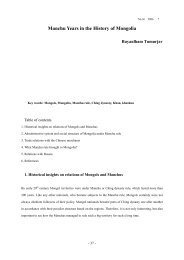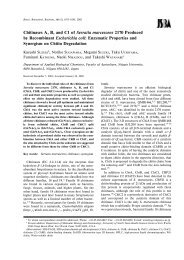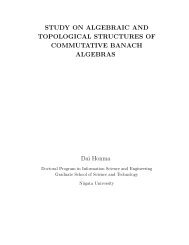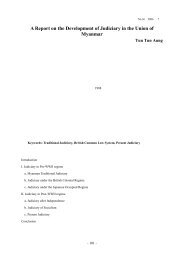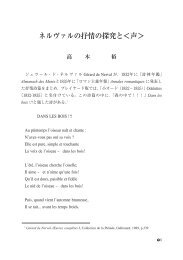An Overview of the Albanian History:
An Overview of the Albanian History:
An Overview of the Albanian History:
Create successful ePaper yourself
Turn your PDF publications into a flip-book with our unique Google optimized e-Paper software.
No.34 2005 12 <br />
36 http://en.wikipwedia.org/wiki/Albania, 2005.09.08<br />
37 Library <strong>of</strong> Congress, Country Study-Albania, April 1992, http://lcweb2.loc.gov/frd/cs/altoc.html, 2005.09.14<br />
38 Koci Xoxe (1817-June 11, 1949) was <strong>the</strong> Defense and Interior Minister <strong>of</strong> Albania for some time after Enver Hoxha<br />
until he was purged for “pro-Yugoslav activities” after Tito broke relations with Hoxha’s ally, Stalin. After a secret trial<br />
in May 1949, Xoxe was executed. http://en.wikipwedia.org/wiki/Albania, 2005.09.09<br />
39 Ghegs is <strong>the</strong> <strong>Albanian</strong> population livingin in <strong>the</strong> nor<strong>the</strong>rn Albania.<br />
40 Tosks is <strong>the</strong> <strong>Albanian</strong> population living in <strong>the</strong> sou<strong>the</strong>rn Albania and consist to about 3 million people. The line <strong>of</strong><br />
demarcation between Tosk and Gheg, is <strong>the</strong> Shkumbin River.<br />
41 A command economy is an economic system in which economic decisions are made by centralized planners who<br />
determine what sorts <strong>of</strong> goods and services to produce and how <strong>the</strong>y are to be priced and allocated, and may include state<br />
ownership <strong>of</strong> <strong>the</strong> means <strong>of</strong> production. Since most known planned economies rely on plans implemented by <strong>the</strong> way <strong>of</strong><br />
command, <strong>the</strong>y have become widely known as planned economies. <strong>An</strong>y economic system that is centrally planned by a<br />
government is commonly referred to as economic statism. To stress <strong>the</strong> centralized character <strong>of</strong> planned economies and<br />
to contrast <strong>the</strong> term with decentralized planning in a market economy, a more specific term, centrally planned economy,<br />
is also used. Although a planned economy may include exchanges <strong>of</strong> money, <strong>the</strong>se exchanges are less important in<br />
allocating resources than <strong>the</strong> central plan. http://en.wikipwedia.org/wiki/Albania, 2005/09/14)<br />
42 A famine is a phenomenon in which a large percentage <strong>of</strong> <strong>the</strong> population <strong>of</strong> a region or country are undernourished<br />
that death by starvation becomes increasingly common. In spite <strong>of</strong> <strong>the</strong> much greater technological and economic<br />
resources <strong>of</strong> <strong>the</strong> modern world, famine still strikes many parts <strong>of</strong> <strong>the</strong> world, mostly in <strong>the</strong> developing nations.<br />
http://en.wikipwedia.org/wiki/Albania, 2005/09/08)<br />
43 Irrigation (in agriculture) is <strong>the</strong> replacement or supplementation <strong>of</strong> rainfall with water from ano<strong>the</strong>r source in order to<br />
grow crops. In contrast, agriculture that relies only on direct rainfall is sometimes referred to as dry land farming.<br />
http://en.wikipwedia.org/wiki/Albania, 2005/09/08)<br />
44 The Cominform (from Communist Information Bureau) is <strong>the</strong> common name for what was <strong>of</strong>ficially referred to as <strong>the</strong><br />
"Information Bureau <strong>of</strong> <strong>the</strong> Communist and Workers' Parties". http://en.wikipwedia.org/wiki/Albania, 2005/09/08)<br />
45 In august 1943, <strong>the</strong> Allies convinced communist and Balli Kombetar to meet in <strong>the</strong> village <strong>of</strong> Mukaj, near Tirana and<br />
to form a Committee for <strong>the</strong> Salvation <strong>of</strong> Albania that could coordinate <strong>the</strong>ir guerilla operations. The two groups<br />
eventually ended all collaboration, however, over a disagreement on <strong>the</strong> postwar status <strong>of</strong> Kosovo.<br />
46 Georgij Mikhailovich Dimitrov) (June 18, 1882 - July 2, 1949) was a Bulgarian Communist leader.<br />
47 http://www.opic.gov/links. 2005/08/18<br />
48 Ibid.<br />
49 Library <strong>of</strong> Congress, Country Study-Albania, April 1992, http://lcweb2.loc.gov/frd/cs/altoc.html, 2005.09.14<br />
50 Ibid.<br />
51 Ibid.<br />
52 Library <strong>of</strong> Congress, Country Study-Albania, April 1992, http://lcweb2.loc.gov/frd/cs/altoc.html, 2005.09.14<br />
53 Ibid.<br />
54 Ibid.<br />
55 The Council for Mutual Economic Assistance (COMECON / Comecon / CMEA / CEMA), 1949 – 1991, was an<br />
economic organization <strong>of</strong> communist states and a kind <strong>of</strong> Eastern Bloc equivalent to <strong>the</strong> European Economic Community.<br />
The military counterpart to <strong>the</strong> Comecon was <strong>the</strong> Warsaw Pact,<br />
http://en.wikipedia.org/wiki/Council_for_Mutual_Economic_Assistance.<br />
56 Library <strong>of</strong> Congress, Country Study-Albania, April 1992, http://lcweb2.loc.gov/frd/cs/altoc.html, 2005.09.14<br />
57 Ibid.<br />
58 Mehmet Shehu (January 10, 1913– December 17, 1981 Tirana) was an <strong>Albanian</strong> politician. Since 1942, Shehu<br />
participated in <strong>the</strong> partisan movement and <strong>the</strong> work <strong>of</strong> <strong>the</strong> <strong>Albanian</strong> Communist Party. In 1943, he was elected as a<br />
candidate member <strong>of</strong> <strong>the</strong> Central Committee <strong>of</strong> <strong>the</strong> Party. From 1943 to 1944 he was <strong>the</strong> commander <strong>of</strong> <strong>the</strong> 1st partisan<br />
brigade. Thereafter, he was a division commander <strong>of</strong> <strong>the</strong> National Liberation Army. From 1944 to 1945 he was a member<br />
<strong>of</strong> <strong>the</strong> <strong>An</strong>ti-Fascist Council <strong>of</strong> National Liberation (<strong>the</strong> provisional government). After Albania was liberated from <strong>the</strong><br />
German occupation (November 1944) Shehu became <strong>the</strong> deputy chief <strong>of</strong> <strong>the</strong> general staff and after he studied in Moscow<br />
he became <strong>the</strong> chief <strong>of</strong> <strong>the</strong> general staff. Later, he was also a lieutenant general and a full general. In 1948, Shehu<br />
“expurgated” <strong>the</strong> party from <strong>the</strong> element who “tried to separate Albania from <strong>the</strong> Soviet Union and lead under Belgrade’s<br />
influence”. This made him <strong>the</strong> nearest person to Enver Hoxha and brought him high <strong>of</strong>fices. However, he remained in<br />
Hoxha's shadow. If he had become a serious rival to Hoxha he would have been eliminated. Shehu was held to be Enver<br />
Hoxha's right hand man and <strong>the</strong> second person in Albania. During 40 years Hoxha was Shehu's friend and nearest<br />
comrade. Shehu was one <strong>of</strong> those who prepared <strong>the</strong> Chinese-<strong>Albanian</strong> alliance and <strong>the</strong> break with <strong>the</strong> Soviet Union<br />
(December 1961). It is claimed that in 1981 Shehu opposed Enver Hoxha's isolationism. He was accused in being a<br />
Yugoslav spy.<br />
On December 17, 1981, he was found dead in his bedroom with a bullet wound to his head. According to <strong>the</strong> <strong>of</strong>ficial<br />
announcement (December 18), he had committed suicide in a nervous breakdown. This was a crime under <strong>Albanian</strong> law.<br />
Shehu was declared to be a “people's enemy”.<br />
59 The Warsaw treaty was drafted by Nikita Khrushchev in 1955 and signed in Warsaw on May 14, 1955. The pact came<br />
- 265 -



